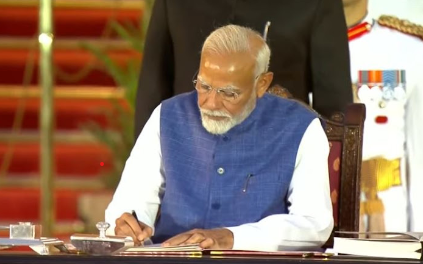Narendra Modi, leader of the Hindu Nationalist Bharatiya Janata Party (BJP), has been sworn in as India’s prime minister for a third term. The ceremony took place at Rashtrapati Bhavan, the official residence of the Indian president. Modi’s BJP-led National Democratic Alliance (NDA) secured victory in the general election with 293 seats, although this was fewer than exit polls had predicted. The opposition saw a resurgence, winning 234 seats.
Thousands attended the inauguration at Delhi’s Presidential Palace, including leaders from Bangladesh, Nepal, Sri Lanka, and the Maldives. Security was tight, with Delhi declared a no-fly zone and over 2,500 police officers deployed.
During the ceremony, President Draupadi Murmu also swore in members of Modi’s new cabinet. Despite predictions of an outright BJP victory, the party lost its parliamentary majority and had to rely on key allies, the Telugu Desam Party (TDP) and the Janata Dal (United) JD(U), to reach the 272-seat threshold needed to form a government.
On Friday, elected MPs voted Modi as the leader of the Lok Sabha, the BJP parliamentary party, and the NDA. It is unclear what concessions were negotiated for the allies’ support, but Indian media reports suggest several allies are seeking key ministerial posts.
The opposition INDIA alliance, led by the Congress party, called the election a mandate against Modi’s government. However, Modi countered, saying the opposition tried to paint the results as a loss, but asserted, “We didn’t lose, we never lost, we will never lose.” He thanked voters and pledged to work towards eradicating corruption and poverty.
“Empowering the poor and middle class is our priority,” he said.
During his election campaign, Mr Modi and his party were accused by critics of using hate speech, attacking the country’s Muslim minority, and jailing opposition figures.
On Friday, the prime minister-elect said the NDA alliance was “committed to the principle of “sarva panth sambhava” (religious equality).
The INDIA alliance has said it will fulfil its duty in parliament by holding the government in check and protecting the constitution.



